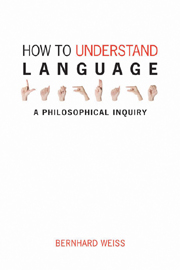Book contents
- Frontmatter
- Contents
- Preface
- 1 The puzzles of language
- 2 The starting-point for analysis
- 3 Analysing sentence-meaning
- 4 Analysing synonymy
- 5 Radical translation
- 6 The structure of a theory of meaning
- 7 Radical interpretation
- 8 Linguistic norms, communication and radical interpretation
- 9 Linguistic normativity
- 10 Radical or robust?
- 11 Language and community
- 12 Rules and privacy: the problem
- 13 Rules and privacy: the solution?
- 14 Truth-conditions versus use-conditions
- Notes
- Bibliography
- Index
7 - Radical interpretation
- Frontmatter
- Contents
- Preface
- 1 The puzzles of language
- 2 The starting-point for analysis
- 3 Analysing sentence-meaning
- 4 Analysing synonymy
- 5 Radical translation
- 6 The structure of a theory of meaning
- 7 Radical interpretation
- 8 Linguistic norms, communication and radical interpretation
- 9 Linguistic normativity
- 10 Radical or robust?
- 11 Language and community
- 12 Rules and privacy: the problem
- 13 Rules and privacy: the solution?
- 14 Truth-conditions versus use-conditions
- Notes
- Bibliography
- Index
Summary
Constraints on an adequate theory of truth
The claim we had isolated as central to Davidson's view of the theory of meaning is that an adequate theory of truth is a theory of meaning. A theory of truth, we noted, will be a systematic specification of truth-conditions for each sentence in the language. Many theories of truth cannot be treated as theories of meaning. So what qualifies a theory of truth as adequate and therefore as a theory of meaning?
Compositionality
Davidson wants a theory of meaning that will make sense of the idea that the meaning of a sentence is determined by the meanings of its parts and the way they are composed in the sentence. Without such an account, he claims, we would be bereft of an explanation of speakers' ability to learn language and their ability to understand novel utterances. These accomplishments are explained by supposing that what underlies or constitutes speakers' linguistic capacities are competencies that relate to a finite vocabulary and to ways in which these elements may be combined grammatically with one another. A speaker's ability to understand novel utterances is an ability to deploy these components of linguistic understanding in hitherto unencountered ways. The theory of meaning reflects this aspect of speakers' understanding by providing the resources for deriving a meaning-specification for every sentence of the language from a finite set of axioms.
- Type
- Chapter
- Information
- How to Understand LanguageA Philosophical Inquiry, pp. 95 - 124Publisher: Acumen PublishingPrint publication year: 2009



